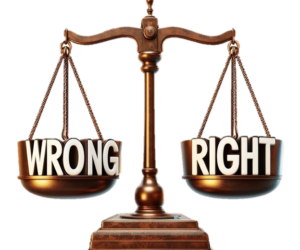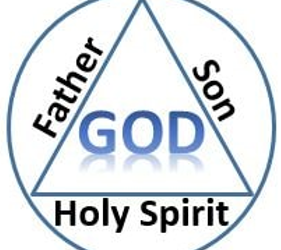On 8/11/2021 I debated Stacy Turbeville on the Trinity and Oneness. You can view the debate here: https://youtu.be/WC8QV-O7gK0. The debate was interesting, to say the least. I have provided my opening statement which was really a series of paragraphs that I read through and commented on. But once we got into the debate it became evident that Mr. Turbeville did not understand the doctrine of the Trinity. I pointed this out several times and he refused to be corrected. He said the Trinity was teaching three gods. He told me that he knows more about the Trinity than I do and that I was teaching three gods. The debate went on like that quite a bit. He accused me of reading into the text of Scripture and yet he would do that exact same thing. Of course, I do not believe I was reading into the Scripture. I would quote a verse and when I asked him to comment on it, he would literally alter the verse as he would go through it. Anyway, it was, in my opinion, a bit of a debacle on his part
The following is my opening statement which I presented by reading as well as commenting. I used a paragraph format because I wanted to add comments as I progressed.
Matt Slick’s Opening Statement in debate with Stacy Turbeville
- To me, the simplicity of the issue of the Trinity vs Oneness comes down to whether or not God is one person or three persons.
- First, define our terms. The doctrine of the Trinity
- There is only one God in all places in all time. There have been no gods before Him and there will be no gods after Him. He is the one and only uncreated, necessary, Trinitarian Being, eternally consisting of three simultaneous and distinct persons, the Father, the Son, and the Holy Spirit. The three persons share the same divine essence, but express different functions in creation. Neither person derives his substance from either or both of the others. In the Trinity are unity and diversity, which are equally basic and mutually dependent upon one another.
- If Mr. Turbeville quotes verses in the Bible about there being only one God, we Trinitarian’s would agree. The doctrine of the Trinity is, by definition, monotheistic. Therefore, any hint that Mr. Turbeville would give that the Trinity is actually more than one God, then he is not arguing against the biblical Trinity. He would be misrepresenting it by saying things like, “you can’t find anything about a god the son in scripture.” He said this on 5/13/2021 in his debate with Anthony Rogers at 14 minutes and 15 seconds. And again at 22:06, he said, “there is not one hint in Scripture of a god the son and a god the Holy Spirit separate from the Father.” Turbeville does not understand the Trinity. We Trinitarians do not believe that Jesus and the Holy Spirit were each a god.
- Define personhood in the context of our discussion tonight. We cannot determine if God is a Trinity of three persons or just one person if we don’t define what we mean by persons. So, in this debate, I’ll ask Mr. Turbeville for a definition of what it means to be a person, as well as some attributes of personhood.
- Nevertheless, I looked in Oneness Theological sources for a definition but did not find a single definition. I found that interesting.
- “personhood. The unique status shared by human beings, angels, and God that involves the power to think, act and value. Traditional theories of personhood stress that persons are substances of a rational nature. More contemporary theories emphasize the ability to act and have emotions, and these often link personhood to the ability to use language and relations to other persons.”1
- https://medicine.missouri.edu/centers-institutes-labs/health-ethics/faq/personhood
- Attributes of personhood. Perhaps Mr. Turbeville will agree with what I’ve found as a definition of personhood as well as characteristics… such as…
- Self-awareness and awareness of others. Recognizing one’s self and others with comments such as ‘you’ and ‘yours,’ and ‘me’ and ‘mine.’
- Can speak and say such things as “I am thirsty,” (John 19:28) and “I am with you always, even to the end of the age,” (Matt. 28:20).
- Possessing a will, being rational, making decisions.
- I hope that Mr. Turbeville aggress with this description of personhood. If he does not, then he will need to provide a different one.
- JESUS WAS A PERSON In his debate on 5/13/2021 that Stacy Turbeville had with Anthony Rogers, he said at 42:33, “the Father is the God in Him [Jesus] that he knew beforehand. The Father knowing Him before. John 17:5 is talking about His same spirit that He shared with the Father. Of course, it was the Father’s spirit. He was the Father before he became the person. That’s what it is talking about. His spirit leaving and going back to the Father. It’s not going back to the Trinity.” (Another example of him not understanding the Trinity)
- So, Mr. Turbeville calls Jesus a person. In light of this, I am asking him to define what it means to be a person and to exemplify attributes of personhood to see if Jesus exhibited personhood. If he fails to do this, then he cannot affirm that God is only one person or deny that God is a Trinity of three persons. After all, this is what the debate is about.
- I’m also asking him how many natures that Jesus the person had while walking on earth 2000 years ago. Was it one nature? If so, which one? Divine or human? On the other hand, if Mr. Turbeville acknowledges that Jesus had two natures, then I want to know if Jesus still, right now, possesses those same two natures in His person.
- The reason this line of questioning concerning Jesus is important is that if, 2000 years ago, Jesus possessed divine attributes in his personhood, and He was addressing the divine person of the Father, then oneness theology is proven false since it would mean there were at least two persons possessing divine nature who addressing each other. It would then be a simple step to establish Trinitarianism by acknowledging the simultaneous personhood of the Holy Spirit.
- If, however, Mr. Turbeville denies that the single person of Christ had two natures, then he is left with three possibilities. 1) the person of Jesus either human, 2) the person of Jesus was divine, 3) the person of Jesus was simply indwelt by the person of the Father. Again, let me emphasize that we are speaking of the nature of the person of Christ. Let me look at these three options.
- First, if Jesus was only human (JWs teach this), then His sacrifice on the cross is not of divine value, and we are dead in our sins. This would mean that any sufficiently good person could have died for our sins.
- Second, if Jesus was only divine, then we do not have a propitiation for our sins since Hebrews 2:17, when speaking of Jesus says, “Therefore, He had to be made like His brethren in all things, so that He might become a merciful and faithful high priest in things pertaining to God, to make propitiation for the sins of the people.” In order to be a high priest, he would’ve had to have been a man.
- Third, if Mr. Turbeville states that the divine nature of the Father was indwelling the human Son, then he is saying that the person of the Son did not have a divine essence in Himself. Jesus, the person, died on the cross. His logic would require that the Father had no part in the death of Christ. This would mean then that the sacrifice on the cross was not divine. It would then mean that we are all dead in our sins because it would’ve just been a good man who died on the cross.
- Furthermore, it would deny Zechariah 12:10 where God states “they will look upon me whom they have pierced…”
- Communicatio Idiomatum one person who has the attributes of both natures. Expand on this per the amount of time remaining.
- This necessitates the sufficiency of the atonement. Because Mr. Turbeville denies the Trinity, he also denies the divine sacrifice of the person of Christ.
- Therefore, according to his theology, we would still be dead on our sins.
References
| 1↑ | Evans, C. Stephen. Pocket Dictionary of Apologetics Philosophy of Religion (The IVP Pocket Reference Series) (p. 91). InterVarsity Press. Kindle Edition. |
|---|






